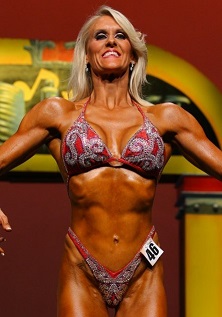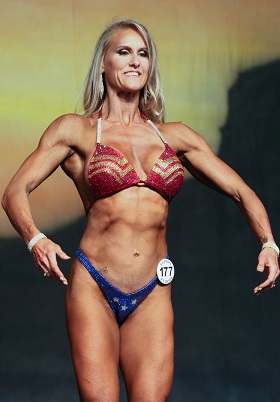In part one of, “Beyond the Stage: The Cost of Competition”, I addressed some of the financial costs to consider before deciding to compete in bodybuilding. If you don’t have discretionary funds in your budget maybe competing might not be in the financial cards for you.
In this article I want to address the mental and physical costs that you should consider before jumping into prepping for a bodybuilding show.
Dieting
The first area I want to cover is the costs of dieting. I am sure you are fully aware that you will be dieting to reach the ideal leanness to be competitive against others on competing. You might believe, you have dieted before and it will not be a big deal. BUT competition lean is a whole extreme level of dieting. Typically, when you have dieted before it may have been to lose a few pounds to look good for a trip or to look good in a bathing suit. The point where you stop is the point where you as a competitor will need to dig deep because you may have to lose 10 to 20 more pounds. Dieting is going to be difficult and you will be hungry.
If people in your life who are non-competitors are telling you that you look great when are a couple weeks out from a show chances are pretty good you are not lean enough yet. The show ready lean competitor can have the appearance of looking sick and people begin to ask if you are okay and comment on your being too skinny. My lean is vascularity everywhere, sunken in face, bones structure visible, and thin translucent skin. I know what you are thinking where can I sign up to get started, but wait there is more.
Ideal competition lean is different than lean. If you are doing the show just to say you did one and not to be competitive then you can compete at a higher body fat percentage. But why would you spend all that money, put in all the time and effort into something you are not even going to try to be competitive at. It baffles me but I have seen it many times. You might have lost a substantial amount of weight and you are proud of your hard work and a bikini competition seems like a good idea. You are still paying hundreds or thousands of dollars to stand on a stage and be subjectively judged.
You have made the decision to diet for a show but do you know what changes your body is going to go through during the process? Your body begins the process of adaptive thermogenesis as soon as you begin a diet.
Adaptive Thermogenesis
When you are in a calorie deficiency your metabolism adapts to your energy intake (i.e. calories consumed). As your metabolism adapts to a decrease in available energy, you will experience changes in your hormones. The hormones being affected include leptin, ghrelin, thyroid hormones, and testosterone. These adaptations are unfavorably affected by calorie restriction and weight loss.
Leptin is your satiety hormone that tells you when to stop eating. When you reduce your calories leptin levels decrease, which then sends a signal to your brain to eat more and burn less. This is your body’s safety mechanism that regulates energy expenditure and food intake. When we are in a deficiency for an expended time period leptin signals can become suppressed. You do not get the signals you are full and can result in you overeating beyond normal capacity. Ghrelin is your hunger hormone. With a limited calorie intake and not responding to signals for hunger the signally could become suppressed. This can be a good thing for suppressing hunger and managing calorie intake.
Thermic effect of food (TEF) is reduced. When you eat carbs and protein about 10% of the calories you eat are burned from just the act of eating. The reduction in overall food intake naturally results in a reduction of total energy expenditure.
Non-exercise activity thermogenesis (NEAT) is the energy expended for everything we do that is not sleeping, eating or sports-like exercise. It ranges from the energy expended walking to work, typing, performing yard work, undertaking agricultural tasks and fidgeting. NEAT), can play a significant role in helping to maximize the total amount of calories burned in a single day. NEAT naturally decreases spontaneous activity decrease.
The longer you diet the more effect you have on your sex hormones. Low levels of testosterone can not only affect your training it can also affect your sex drive. You might find your once high sex drive is stuck in neutral.
These changes in your basal metabolic rate, NEAT and other systems is known as Adaptive Thermogenesis. This is your body’s way of counter balancing the changes happening while dieting.
Behavior Changes
Due to your low carbohydrate and overall low-calorie intake, as your metabolism begins to adapt you will notice some changes in your behavior. Actually, you might not even think you are any different but those around you will. Reduced carbohydrate intake means less glucose for your brain and nervous system and other sources must provide glucose. One change that will be apparent is your mood. You will become irritable, short tempered, small things will set up off, maybe some yelling and scream at people for the littlest things. Those around you will notice you are angry more often. One client of mine would yell at people who spoke to her while she ate. I personally, will get upset with people who eat off my plate when I already weighed out my food. I also don’t allow my family to eat certain protein sources so I can have them for my meal prep for my diet. I know you are like WHAT? But seriously, my family can eat everything and they want the one thing I eat to keep me on track.
Due to the lack of available nutrition, you will become hyper focused on food. This can be seen by you meticulous counting your calories/macros, trying to find ways to be created with your limited calories, thinking about food all the time and when your next meal is. You generally spend way more time creating a low-calorie masterpiece in a diet phase than you would be when you are not dieting.
Reduced calories mean reduced energy levels to support your everyday activities.
Energy Levels
At the beginning of prep, you are highly motivated. Your training sessions are strong and you are still achieving personal records in the gym. As your prep continues your energy levels begin to decrease due to the lack of calories. Your calories may be cut many times as training increases over the months to create a calorie deficiency to achieve the expected body composition. Your energy level is in the toilet and you are barely moving throughout the day except for the most basic things you have to do. You are tired all the time and can not seem to recover from your workouts. Your sleep begins to suffer as cortisol levels rise. Your exercise program could consist of 5-6 days of strength training with 1 hr daily cardio sessions to 2 a day cardio sessions. Even though you are so tired the physical changes you are seeing in your body gives you motivation to push forward.
Physical Changes
Your body is changing as you get leaner and you start to see definition you did not know you had and you are in love with the new look. BUT, wait a minute. The new body you have is now below a healthy body fat percentage. This lean body should be viewed as temporary not permanent. Far too many competitors fall in the love with that lean physique and develop body dysmorphia. The reality that this lean physique is unhealthy to maintain after the show is over can cause many problems for you if you do try to hold on to it. Which leads us to pulling back the curtain of the bodybuilding stage.
Behind the curtain are the true horror stories that come out. Competitors not working with a coach or don’t have a post-show plan can start a destructive binge diet cycle. During dieting you have a list of foods you can not eat because it is too many calories. You create a list of all the places or the foods you are going to eat post show. It does not stop at one celebration meal for all your hard work. No, it turns into days of eating all the foods you couldn’t eat. And with your leptin hormone suppressed you binge eat way beyond a normal intake for a meal. After a week of unrestricted eating you realize you have gained 10-15 lbs. WOW! Visually you looked amazing 1 week before and now your abs are gone, your definition is fading and you feel fluffy. You might be back at your normal healthy body fat percentage but your metabolism is still in a suppress state and needs time to adapt.
BUT you the competitor is now unhappy with how you look and you decide you are going to start dieting again. Now begins the vicious cycle of dieting and bingeing. Now that you have eating all those foods you missed you tell yourself that you can eat just one more meal untracked it won’t make a difference anyway since you gained all this weight already. But at the same time, you continue to try to diet so you don’t end up back where started or weighing more. HOWEVER, dieting is not going to work for you at this stage of the game. Your metabolism is in a suppress state and needs time to adapt to higher calories before another dieting phase can’t begin. If you continue the binge and diet cycle to hold onto your remain physique chances are pretty good you are going to look like you don’t even workout after a month. Trust me, after my first show I tried to hold on to the leanness but couldn’t because I couldn’t get a handle on my diet. It became a vicious cycle. Now as a prep coach during the dieting process when my competitor reaches a healthy body weight that is manageable I ask them to remember their weight and how they looked because this will be where we come back to when the show is over. Generally, a good idea is to take at least 6 months to build up your metabolic capacity and for your hormones to return to normal levels before even thinking about dieting again or prepping for another show.
Before I move on let’s discuss WHY you gained weight rapidly in a short amount of time. Remember above I discussed adaptive thermogenesis, during the dieting phase your metabolism adapted to meet the energy intake you provided it to maintain basic body functions like breathing. Your body adapted to this intake so when you ate a vast number of calories over what your body expected it rapid stored the extra energy as fat. Additional your total daily energy expenditure was at a higher weight now at a lower weight it is reduced.
In some case, you may develop an eating disorder or body dysmorphia. Body dsymorphia emerges when you begin to have unrealistic expectation about what you body should look like. You long for the lean unhealthy body composition and are no longer comfortable being at a normal body fat percentage. It is important to work with your coach, doctor and a counselor to address eating disorders. It is a serious issue that needs to be treated with professional help from someone who works with this type of issue. If you have every had an eating disorder, dieting and competing should not be some you should consider because it will most likely reactivate your disorder. As part of the physical changes you experience, digestive issues may also become a concern.
Digestive Issues
The reduction in calories during a dieting period can result in some digestive issues. Consuming fewer carbohydrates means you could be consuming less fiber. It is not uncommon for you to experience limited bowel movements due to less food volume intake. Bloating is another issue that plagues competitors. In an effort to reduce calories you might start using artificial sweeteners, chewing sugar free gum, or eating diet food that might have fillers. These additions to your diet along with less fiber and not enough water can make for an uncomfortable situation. Before you start adding things into your diet consider just adding one thing at a time and making sure your body does not react to it. It may also be beneficial towards the end of prep when you are having challenges with bowel movements to add a fiber supplement to allow to reach your fiber requirements. Bowel movements assist with removing undigested waste from your body and supports overall weight loss.
Physcologically
Let’s say you put in the work. You achieved stage lean, make up is on point, you nailed your posing and the results come in. You did not even place in the top 5 in the division you competed in. Your friends and family say you were robbed and you should have won. You feel deflated and start to try to analyze what you did wrong or could have done better. Judging bodybuilding shows is subjective. While the judges have some guidelines it could come down to some of the most basic things like the color of your suit, your make up and hair. You do not have any idea who you are competing against and what package they are bring to the stage. While you might have done everything you could have, you have to understand you may not win or even place. Competing is a subjective sport. If you do not win or even place this can be demoralize and create doubt and break your confidence. You might also start bad mouthing the other competitors vs congratulating them for their hard work.
As you can see competing in a bodybuilding show can be a physically demanding sport that takes you to the most extreme levels of leanness. The levels of leanness you must achieve to be competitive are unhealthy and can be dangerous. It is important that if you want to compete and be competitive that you should work with a qualified coach that specializes in prepping clients for the stage. There are many prep coaches but few that have the experience necessary to help you reach your potential in a healthy way. My number one advice is do your homework. Interview many coaches about their programs. Do not choose the one with the biggest client transformation picture or largest client roster. Consider a coach that limits who they work with because that coach is the one that is not trying to pad their resume and that is a coach that cares about you and can take you to the top level.
In the next part of the series, I will be discussing the relationship costs of competing in bodybuilding. It is a cost that is never considered before choosing to compete and it can the one that changes everything for you.
Read Part 1: Beyond the Bodybuilding Stage:The Financial Costs of Competition
Read Part 3: Beyond the Bodybuilding Stage: The Relationship Costs of Competition




